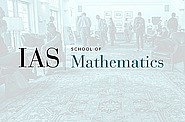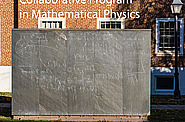Seminars Sorted by Series
Celebration In Honor of the Frank C. and Florence S. Professorship
Oct
13
2022
Celebration In Honor of the Frank C. and Florence S. Professorship
MODULAR CURVES, MODULAR FORMS AND HECKE OPERATORS: OLD AND NEW
Winnie Li
3:00pm|Simonyi Hall 101
Oct
13
2022
Celebration In Honor of the Frank C. and Florence S. Professorship
A GUIDE TO MOONSHINE
John Duncan
4:15pm|Simonyi Hall 101
Celebration of Women in Mathematics
May
12
2021
Character Varieties, Dynamics and Arithmetic
Nov
10
2021
Character Varieties, Dynamics and Arithmetic
Dynamics on character varieties
10:00am|Simonyi Hall 101 and Remote Access
Nov
17
2021
Character Varieties, Dynamics and Arithmetic
Dynamics on character varieties
10:00am|Simonyi Hall 101 and Remote Access
Nov
24
2021
Character Varieties, Dynamics and Arithmetic
No seminar: Thanksgiving Holiday
10:00am|Simonyi Hall 101 and Remote Access
Dec
01
2021
Character Varieties, Dynamics and Arithmetic
Integral points on character varieties
Junho Peter Whang
10:00am|Simonyi Hall 101 and Remote Access
Dec
08
2021
Character Varieties, Dynamics and Arithmetic
Effective mapping class group dynamics
10:00am|Simonyi Hall 101 and Remote Access
Dec
15
2021
Character Varieties, Dynamics and Arithmetic
The dynamics of Aut(Fn) actions on group presentations and representations
10:00am|Simonyi Hall 101 and Remote Access
Clay Research Conference - an Online Event
Sep
30
2021
Clay Research Conference - an Online Event
Convex Integration and Synthetic Turbulence
1:30pm|Simonyi 101 and Remote Access
Sep
30
2021
Clay Research Conference - an Online Event
Gauge Theory and the Analytic Approach to Geometric Langlands
4:00pm|Simonyi 101 and Remote Access
Sep
30
2021
Clay Research Conference - an Online Event
The Work of Buckmaster, Isett and Vicol and Presentation of the Clay Research Award to Tristan Buckmaster, Philip Isett and Vlad Vicol
Camillo De Lellis and Thomas Clay
5:10pm|Simonyi 101 and Remote Access
Cluster-Polyfold Setup for Langrangian Floer Homology
Oct
10
2005
Cluster-Polyfold Setup for Langrangian Floer Homology
http://www.math.ias.edu/~wehrheim/cp/
9:00am|West Building Lecture Theatre
Oct
11
2005
Cluster-Polyfold Setup for Langrangian Floer Homology
http://www.math.ias.edu/~wehrheim/cp/
9:00am|West Building Lecture Theatre
Oct
12
2005
Cluster-Polyfold Setup for Langrangian Floer Homology
http://www.math.ias.edu/~wehrheim/cp/
9:00am|West Building Lecture Theatre
Oct
13
2005
Cluster-Polyfold Setup for Langrangian Floer Homology
http://www.math.ias.edu/~wehrheim/cp/
9:00am|West Building Lecture Theatre
Oct
14
2005
Cluster-Polyfold Setup for Langrangian Floer Homology
http://www.math.ias.edu/~wehrheim/cp/
9:00am|West Building Lecture Theatre
Collaborative Workshop in Algebraic Combinatorics
Collaborative Workshop in Algebraic Geometry
Collaborative Workshop in Several Complex Variables
Combinatorics of Fundamental Physics Workshop
Nov
18
2024
Combinatorics of Fundamental Physics Workshop
Amplituhedra and Origami
Pavel Galashin
10:00am|Wolfensohn Hall
Nov
18
2024
Combinatorics of Fundamental Physics Workshop
Probing Moduli Space Cohomology Using Quantum Field Theory
Michael Borinsky
11:30am|Wolfensohn Hall
Nov
18
2024
Combinatorics of Fundamental Physics Workshop
Combinatorics of Symbol Alphabets in N=4 Yang-Mills
Anastasia Volovich
4:00pm|Wolfensohn Hall
Nov
19
2024
Combinatorics of Fundamental Physics Workshop
Kinematic Flow and Differential Equations for Cosmological Correlators
Austin Joyce
10:00am|Wolfensohn Hall
Nov
19
2024
Combinatorics of Fundamental Physics Workshop
Euler Discriminant of Complements of Hyperplanes
Claudia Fevola
11:30am|Wolfensohn Hall
Nov
19
2024
Combinatorics of Fundamental Physics Workshop
Non-Planar On-Shell Diagrams
Jaroslav Trnka
2:00pm|Wolfensohn Hall
Nov
19
2024
Combinatorics of Fundamental Physics Workshop
Canonical Forms of Oriented Matroids
Chris Eur
3:30pm|Wolfensohn Hall
Nov
20
2024
Combinatorics of Fundamental Physics Workshop
Hopf Algebras in the Cohomology of A_g
Melody Chan
10:00am|Wolfensohn Hall
Nov
20
2024
Combinatorics of Fundamental Physics Workshop
Cluster Structures on Kinematic Spaces
Lara Bossinger
11:30am|Wolfensohn Hall
Nov
20
2024
Combinatorics of Fundamental Physics Workshop
Adjoints and Canonical Differential Forms
Simon Telen
2:00pm|Wolfensohn Hall
Nov
20
2024
Combinatorics of Fundamental Physics Workshop
Adventures in Configuration Space
4:00pm|Wolfensohn Hall
Nov
21
2024
Combinatorics of Fundamental Physics Workshop
Combinatorics and Geometry of the Amplituhedron
Lauren Williams
10:00am|Wolfensohn Hall
Nov
21
2024
Combinatorics of Fundamental Physics Workshop
Loop Integration: Phenomenology, Polemics, and Prospects Ahead
Jacob Bourjaily
11:30am|Wolfensohn Hall
Nov
21
2024
Combinatorics of Fundamental Physics Workshop
Combinatorics on Words in String Amplitudes
Oliver Schlotterer
2:00pm|Wolfensohn Hall
Nov
21
2024
Combinatorics of Fundamental Physics Workshop
Topological Aspects in Algebraic Optimizations
3:30pm|Wolfensohn Hall
Nov
22
2024
Combinatorics of Fundamental Physics Workshop
Aspects of Correlators and Amplitudes
Song He
10:00am|Wolfensohn Hall
Nov
22
2024
Combined Members’ Seminar and Mathematical Physics Seminar
Feb
18
2009
Combined Members’ Seminar and Mathematical Physics Seminar
Generalizations to Boltzmann-Maxwell Interaction Dynamics
11:15am|S-101
Complex Algebraic Geometry
Sep
27
2006
Complex Algebraic Geometry
Polarized Logarithmic Hodge Structures and Enlargements of Griffiths Domain
Sampei Usui
2:00pm|Simonyi Hall Classroom - (S-114)
Oct
04
2006
Oct
25
2006
Nov
01
2006
Complex Algebraic Geometry
Locally Residual Currents and Dolbeault Cohomology on Projective Manifolds
1:00pm|S-101
Nov
08
2006
Nov
15
2006
Complex Algebraic Geometry
Compactification of Moduli Spaces of Drinfeld's Shtukas
Ngo Dac Tuan
1:00pm|S-101


